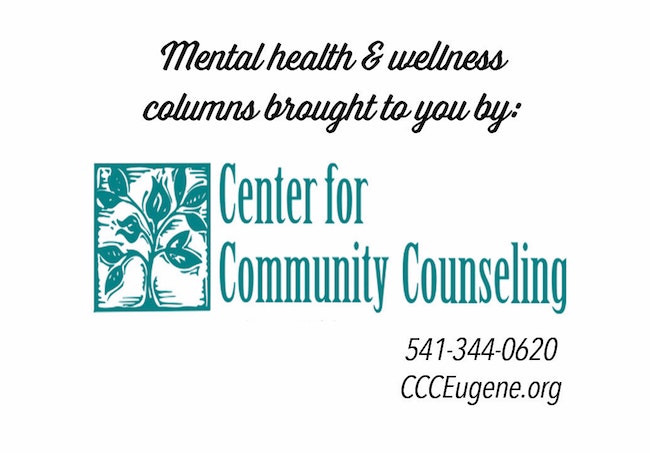
Editor’s note: In partnership with the Center for Community Counseling, The Chronicle publishes columns addressing mental-health issues in our community. Reach out for help at 541-344-0620 and ccceugene.org.
One of the best things we can do to help improve our mental health is to move our bodies. Exercise not only strengthens our muscles and improves our cardiovascular health, but it can also reduce symptoms of anxiety and depression.
Exercise releases “feel-good” endorphins which enhance feelings of well-being and also distract us from our worries which can help us get away from negative thought spirals that increase negative feelings associated with anxiety and depression. Studies have found that in cases of mild to moderate depression, physical activity works just as well as antidepressants and with no side effects that often come with psychiatric medications.
Not only this, but exercise can be used preventatively to reduce the likelihood of a future episode of major depression. You might notice that you start to have improvement in depression symptoms including more motivation, less fatigue, and increases in energy from an exercise routine.
What about anxiety?
Exercise naturally relieves tension and boosts energy counteracting the negative symptoms of anxiety such as feeling tense or stressed and fatigued. Exercise, when done as part of a mindfulness practice, can ease symptoms even further by noticing the breath, the sensations in the body, or the sounds around you. Through both distracting from worried thoughts or other negative thought spirals and mindfully being present, anxiety symptoms may have an immediate reduction. With a continued practice of this, you might notice that anxiety throughout your days is significantly reduced.
For those that may not feel they have an anxiety disorder but are experiencing high levels of stress due to work, family, or a difficult life event, you might experience similar results from a mindful exercise practice.
Even if you are not experiencing mental illness, moving your body can benefit your mind and well-being in many ways. The positive effects of physical activity include:
■ Relieves stress
■ Improves memory
■ Improves sleep
■ Boosts your mood
■ Reduces anger or frustration
■ Distracts from worries
■ Improved confidence and self-esteem
■ Increases energy
What do I need to do to get these benefits?
Exercise and physical activity are different things. Physical activity is anything that involves moving your body; this can be light gardening or chores around the house.
Exercise on the other hand is structured movement with the intention of maintaining or improving physical fitness. You’ll see the most benefit from implementing intentional exercise into your routine, but that doesn’t mean you need to dedicate hours to intense sweat sessions at the gym.
Start where you are at and gradually add exercise to your routine. If you don’t exercise at all, consider adding a few short walks to your week (aim for 10 minutes, then see if you can keep going a little bit longer). The more you exercise the more energy you will have and the longer you’ll be able to go.
To best see these benefits, aiming for at least 30 minutes of moderate intensity exercise five days a week is a good goal. Moderate exercise means that you feel warm, but are not drenched in sweat or overheating. Your breath should be a little heavier than usual but you should still be able to chat with someone.
How do I get started?
When struggling with anxiety and/or depression it can be hard to convince yourself to exercise, so start small. You don’t need to be working out five days a week for 30 minutes right away.
If you’re struggling to get up and move, just do it for five minutes. Walk in place while you watch TV or listen to a podcast or even better, get outside and walk five minutes in the fresh air. Oftentimes once you start, it’s easier to keep going. You might find that your five-minute walk that you didn’t want to go on turns into a 20-minute walk.
A little exercise is always better than nothing, and when done consistently, you’ll notice the results.
Mariah Sullivan is a counseling intern at the Center for Community Counseling, getting her Master’s degree in counseling psychology. She is a certified personal trainer and long-distance runner who believes in health and fitness for all sizes. She hopes to encourage people to get active for well-being instead of for weight loss.







